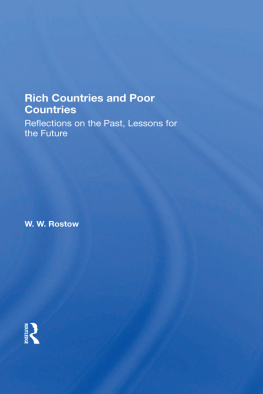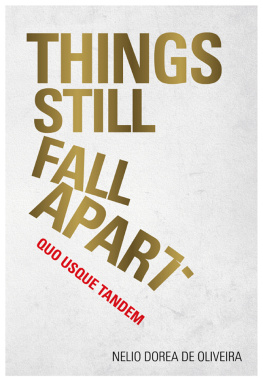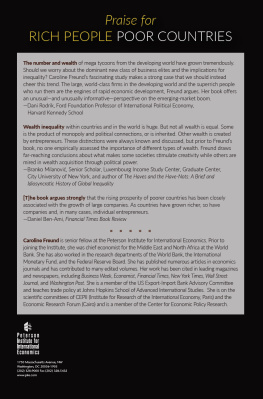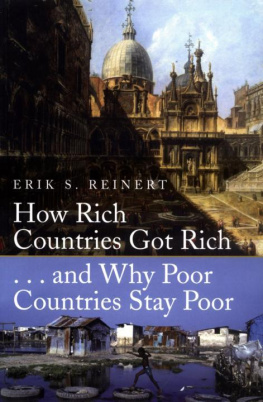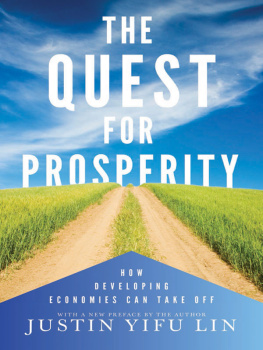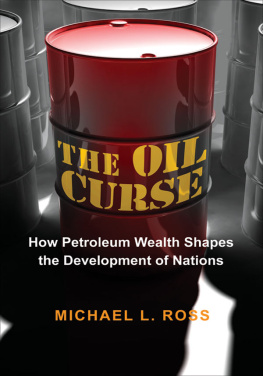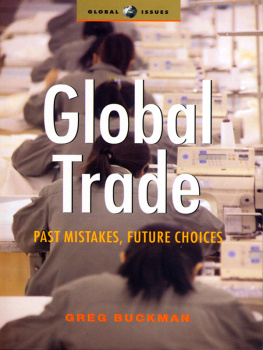Rich Countries and Poor Countries
About the Book and Author
In these ten graceful and learned essays, Professor Rostow addresses the future of the world and its economy from the perspective of his more than forty years of study and reflection on the problems of economic development. Rostow focuses on how we are to create and sustain a civilized and industrious world society in an international trading system beset by historic trends with enormous potential for disruption.
These powerful forcesincluding an industrial revolution of microelectronics, genetic engineering, robots and lasers, and the diffusion of high technology to low-wage areasare creating different sets of irrevocably intertwined problems for nations around the world.
The issues are illuminated here by Rostows mastery of economic history as well as the history of political economy. In addition to general discussions placing the issues historically and intellectually, there are essays highlighting the particular concerns of Mexico, India, Japan, and the Pacific Basin. In his final remarks, Rostow speculates on how the large economic trends affecting the superpowers may lead gradually to a truly significant lessening of East-West tensions. This book will be valuable for any citizen or student concerned about the future of the global economy.
W. W. Rostow is professor of political economy at the University of Texas, Austin. He has taught at, among other universities, Oxford, Cambridge, and MIT, and is the author of twenty-six volumes, among them The Process of Economic Growth, The Stages of Economic Growth, and The World Economy: History and Prospect.
First published 1987 by Westview Press
Published 2019 by Routledge
52 Vanderbilt Avenue, New York, NY 10017
2 Park Square, Milton Park, Abingdon, Oxon OX14 4RN
Routledge is an imprint of the Taylor & Francis Group, an informa business
Copyright 1987 by W. W. Rostow
All rights reserved. No part of this book may be reprinted or reproduced or utilised in any form or by any electronic, mechanical, or other means, now known or hereafter invented, including photocopying and recording, or in any information storage or retrieval system, without permission in writing from the publishers.
Notice:
Product or corporate names may be trademarks or registered trademarks, and are used only for identification and explanation without intent to infringe.
Library of Congress Cataloging-in-Publication Data
Rostow, W. W. (Walt Whitman), 1916
Rich countries and poor countries.
Includes index.
1. Economic history. 2. Economic development.
3. International economic relations. I. Title.
HC51.R665 1987 337 878280
ISBN 13: 978-0-367-28607-1 (hbk)
To Elspeth
These essays, written or delivered in the period 1983 to 1986, reflect an idiosyncratic aspect of the way I work. When developing a new set of ideas I generally conduct in counterpoint a series of tests. I try to apply the emerging new concepts to a range of particular problems or circumstances.
These exercises fulfill several purposes.
First, I learn whether the new ideas are viable. If they dont usefully illuminate problems that should fall within their range, they are not worth pursuing. But even if the experiments in application appear reasonably positive, I, at least, always learn something from them, and they thereby enrich the final version of the larger work on which I am engaged.
Second, in using such experimental exercises to fulfill the inevitable extracurricular speaking demands of modern academic life, one reduces the risk of boring others as well as the certainty of boring oneself by reaching into the sermon barrel. Audiences sense accurately whether what you have to say is part of a fresh, current exploratory effort or old hat; and the questions, discussion, or head-on debate in the wake of such talks is generally informative.
The particular setting for this book is the following. In July 1979 I finished the last of four related books centered on the history of the world economy. After that effort, which I had set as a goal more than thirty years earlier, I turned to another theme reflecting the years that I, like many of my generation, had spent in public service the relation between ideas and action. Six case studies, each a short book, followed. I had nearly completed the last of these books when a years leave of absenceearned by my wife for both of usbecame possible. Because the final case study was devoted to the past and future of regional organization in Asia, we headed west from Austin, reflects some conclusions of that book.
The year abroadwith visits to thirty-four countries and intense speaking schedules for both of usstarted me on my next major enterprise, which had been on my mind since the early 1960s and arose from one aspect of the reception accorded The Stages of Economic Growth (1960). Although much debated, that work was, as books go, something of a success. Many men and women in the developing regions and in Communist countries derived a great deal from the work. It was also widely read in Japan and the West. And it goes on having a life of its own. For example, it was recently published and widely circulated in China.
However, The Stages also stirred up a good deal of controversy, which I regarded as inevitable and appropriate for a new set of ideas and which I rather enjoyed. Only one aspect of the debate troubled me. I evidently failed to direct my fellow economists to a basic fact: The Stages , as I had explained in , was rooted in a dynamic theory of production and prices already elaborated in my earlier book, The Process of Economic Growth (1953, 1960). This failure of communication may have resulted from imperfections in my exposition. But in part, at least, it may also have resulted from the fact that The Stages emerged at just the time that two other methods of growth analysis came on stage: the neoclassical growth models launched in 1955 and 1956 in articles by Robert Solow, T. W. Swan, and James Tobin; and Simon Kuznetss great effort in organizing the statistical morphology of growth, which began to emerge in 1956. (My Economic Journal article on the take-off of developing countries appeared in March 1956.) It is possible that my insistence on the critical importance of the absorption of specific technologies in particular sectorswhich neither of the other two highly aggregated methods of analysis were designed to handlelay at the bottom of the lively but somewhat evasive and inconclusive controversy that followed.
Be that as it may, I decided in the 1960s that I would one day try to set out a final version of my theory of growth (not merely the stages) in a form that would more effectively dramatize the need for a disaggregated sectoral treatment of the process of invention and innovation and for treatment of other neglected features of the process of growth. That decision was brought into sharp focus by the almost obsessive interest and concern with the new technologies we encountered of the present book suggestsand the other chapters elaboratesome of the large themes I now envisage the study will ultimately address.
The chapters of this book are, essentially, variations on those themes. Inevitably, therefore, there is a certain amount of repetition, even after editing. After considering the alternatives, I decided the best course was to accept that outcome rather than to deform the line of argument used on each occasion.
Five of these chapters have been previously published. I have edited out some of the more parochial passages that focused on the specific settings to which these essays and talks were addressed, but I have added brief prefatory notes explaining the circumstances. On the other hand, I have not rewritten these essays in the form of conventional chapters of a book.

